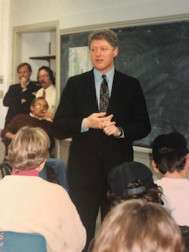Our Beginnings
An educational needs assessment conducted for the City of Concord in 1970 revealed that Concord was in need of a comprehensive adult education program. According to the 1970 Census, 42% of Merrimack County’s adult population had not finished high school. In response, two educators, Ruth Hooke and Nancy Callahan, took up the challenge.
With $4,000, two part-time staff members, a babysitter and a handful of volunteers, they opened the doors of Second Start in the basement of the First Congregational Church in February of 1971. The program operated two mornings a week providing instruction in basic reading, writing, math, and life-coping skills.
In September 1971, the childcare program was licensed by the State. In September 1972, one part-time business teacher was hired and with two donated typewriters, the clerical training program began to provide adults with employable skills.
Continued Development in the Seventies
In 1974, Second Start was awarded a federal grant from the U.S. Department of Education to further develop literacy programs. The first full-time staff member was hired and the scope of the agency’s services expanded.
The program outgrew the facilities at the First Congregational Church and, in the spring of 1975, moved to the recently vacated West Concord Firehouse.
The First Half of the Eighties
1980-1985
In the spring of 1980, the Adult Basic Education, Office Skills Training and Daycare Programs moved to the Walker Building on the New Hampshire Hospital grounds. This move made possible the expansion of the daycare program from 15 children part-time to 55 children full-time.
Additional support services for welfare mothers were added, as well as a volunteer tutorial program and English as a Second Language classes to serve the influx of Asian refugees.
September of 1984 saw the addition of programming designed for adolescents who had been unsuccessful in finding and maintaining employment. A substance abuse program was also added.
In 1986, Second Start was cited by the United States Department of Education as an outstanding example of excellence in Adult Education.
By 1987 over 1,800 children and adults were served by Second Start.
1985-1990
Second Start negotiated a sale with the Concord School Board (May, 1987 to January, 1988) for the purchase of the old Garrison Elementary School for nominal consideration.
The City of Concord applied for and was awarded, on Second Start’s behalf, two Community Development Block Grants from the Office of State Planning in 1987 & 1988 in the amount of $231,000 to assist with renovations.
The Board of Directors conducted Second Start’s first ever Capital Campaign in the spring of 1988 and raised approximately $600,000 from the Greater Concord community and $100,000 from private foundations.
The Adult Education, Office and Training and Childcare programs moved from the Walker Building to the newly renovated Garrison building in time for September classes.
Second Start in the Nineties
In 1990, Second Start’s Adult Literacy program was recognized by the U.S. Department of Education as one of the ten best literacy programs in the country. The agency name was changed from Project Second Start to Second Start.
In 1994, Second Start was able to upgrade its instructional computers and the office program had a 100% workforce placement rate.
Second Start again received the Secretary of Education’s Award for Outstanding Adult Education and Literacy Programs in the September of 1996.
In August of 1999, the Office Program received full accreditation from the Department of Education to administer federal financial aid (Title IV) money.
In 1998, Second Start was awarded a statewide contract to provide intense employment counseling services to welfare recipients. The program expanded to serve the communities of Concord, Manchester, Nashua, Salem, Plymouth, Littleton, Colebrook, Keene, Claremont, Lebanon, Conway, Berlin, Rochester/Dover and Portsmouth/Exeter.
Second Start’s Student Assistance program grew, in 1998, to include drug, alcohol and violence prevention services at the elementary school level.
Second Start in the New Millennium
In 2001, the English as a Second Language (ESL) population at Second Start almost doubled. Also, the agency implemented a major technology upgrade with the purchase of 92 new PCs.
In 2005, the Alternative High School received approval as a special education program for adolescents. Seventy-five percent of the Alternative High school students either returned for another year of school or graduated.
The Office Program, now called the New Hampshire Career Institute, graduated their final student cohort with graduation and placement rates well above the established national benchmarks for career training schools.
The ESL services were extended to include new partnerships with private sector business to bring ESL classes to the workplace and enrollment in the Adult Learner Services Tutorial Program increased significantly.
Between 2012 and 2014, our enrollment of adults in our English as a Second Language classes surpassed our total number of adults enrolled in all of our other adult education classes.These immigrant and refugee students came from over 30 different countries.
In June of 2014, Second Start paid off its mortgage for the former Garrison Elementary School and took outright ownership of the building.
In 2015, the English as a Second Language program continued to expand and currently represents 85% of the students served by our adult education classes. The Alternative High School received its five year accreditation as a special education program for high school students ages 14 to 20.
In 2017, we replaced the First Start Children’s Center playground, originally installed in 1989, to the delight of the children and their parents.
In the fall of 2018, Second Start started a state approved driver education program, the New American Driving School.
In September of 2019, the Concord School District contracted with Second Start to coordinate the Adult Diploma Program. Even faced with the challenges of on-line learning due to the COVID-19 outbreak, several adult students earned their high school diploma in the spring of 2020. Diplomas were presented in front of the student’s homes.
In the spring of 2020, the Alternative High School received another five year accreditation as a special education program for high school students ages 14 to 20.






































































